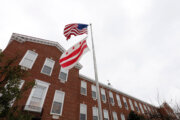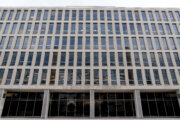Israeli drone strikes hit Kamal Adwan Hospital on Tuesday, wounding three medical staff at one of the few hospitals still partially operating in the northernmost part of Gaza, the facility’s director said. Dr. Hossam Abu Safiya said the drones were dropping bombs, spraying shrapnel at the hospital. There was no immediate comment from the Israeli military.
In Lebanon, a tenuous ceasefire between Israel and Hezbollah has held despite Israeli forces carrying out several new drone and artillery strikes on Tuesday, killing a shepherd in the country’s south. Israeli Prime Minister Benjamin Netanyahu vowed keep striking “with an iron fist” against perceived Hezbollah violations of the ceasefire.
Hezbollah began launching rockets, drones and missiles into Israel last year in solidarity with Hamas militants who are fighting in the Gaza Strip. The war in Gaza began when Hamas-led militants stormed into southern Israel on Oct. 7, 2023, killing some 1,200 people, mostly civilians, and taking around 250 people hostage.
Israel’s blistering retaliatory offensive has killed at least 44,500 Palestinians, more than half of them women and children, according to Gaza’s Health Ministry, which does not say how many of the dead were combatants. Israel says it has killed over 17,000 militants, without providing evidence.
The war in Gaza has destroyed vast areas of the coastal enclave and displaced 90% of the population of 2.3 million, often multiple times.
___
Here’s the Latest:
US forces in eastern Syria conduct a self-defense strike, Pentagon says
WASHINGTON — U.S. forces conducted a self-defense strike Tuesday in the vicinity of Mission Support Site Euphrates, a U.S. base in eastern Syria, against three truck-mounted multiple rocket launchers, a T-64 tank and mortars that Pentagon press secretary Maj. Gen. Pat Ryder said presented “a clear and imminent threat” to U.S. troops.
The self-defense strike occurred after rockets and mortars were fired that landed in the vicinity of the base, Ryder said. The Pentagon is still assessing who was responsible for the attacks — that there are both Iranian-backed militias and Syrian military forces that operate in the area.
Ryder said the attack was not connected to the offensive that is ongoing in Aleppo, where Syrian jihadi-led rebels taken over the country’s largest city. The U.S. has about 900 troops in Syria to conduct missions to counter the Islamic Stage group.
Israeli drone strikes hit a hospital in northern Gaza, wounding 3 medical staff
CAIRO — Israeli drone strikes hit the Kamal Adwan Hospital in northern Gaza on Tuesday, wounding three medical personnel, the facility’s director said.
Dr. Hossam Abu Safiya said the drones were dropping bombs, spraying shrapnel at the hospital, located in the town of Beit Lahiya. There was no immediate comment from the Israeli military.
In comments released by Gaza’s Health Ministry, Abu Safiya said one of the injured was in critical condition and was undergoing a complex surgery.
“The situation has become extremely dangerous,” he said. “We are exhausted by the ongoing violence and atrocities.”
Kamal Adwan Hospital has been struck multiple times over the past two months as Israeli forces have waged a fierce offensive in the area, saying they are rooting out Hamas militants who regrouped there. In October, Israeli forces raided the hospital, saying that militants were sheltering inside and arrested a number of people, including some staff. Hospital officials denied the claim.
Abu Safiya was wounded in his thigh and back by an Israeli drone strike on the hospital last month.
Israeli court orders Netanyahu to take the stand in his long-running corruption trial
TEL AVIV, Israel — An Israeli court has ordered Prime Minister Benjamin Netanyahu to take the stand next week in his long-running corruption trial, ending a long series of delays.
Netanyahu’s lawyers had filed multiple requests to put off the testimony, arguing first that the war in Gaza prevented him from properly preparing for his testimony, and later that his security could not be guaranteed in the court chamber.
In Tuesday’s decision, judges in the Jerusalem district court said that following a security assessment, his testimony will be moved to the Tel Aviv district court. Israeli media said the session would take place in an underground chamber.
His testimony in the trial, which began in 2020, is expected to begin on Dec. 10 and to last at least several weeks.
Netanyahu is charged with fraud, breach of trust and accepting bribes in three separate scandals involving powerful media moguls and wealthy associates. He denies wrongdoing.
Lebanese civilians who came back to war-damaged towns are skeptical that Israel will abide by the ceasefire
NABATIYEH, Lebanon — In destroyed areas of southern Lebanon, residents clearing away rubble on Tuesday said they didn’t trust Israel to abide by the week-old ceasefire with Hezbollah.
“The Israelis are breaching the ceasefire whenever they can because they are not committed,” said Hussein Badreddin, a vegetable seller in the southern city of Nabatiyeh, which was pummeled by Israeli airstrikes over several weeks. “This means that they (can) breach any resolution at any time.”
Since it began last Wednesday, the U.S.- and French-brokered 60-day ceasefire has been rattled by near daily Israeli strikes, although Israel has been vague about the purported Hezbollah violations that prompted them.
Imad Yassin, a trader who owns a clothing shop in Nabatiyeh, said Israel was constantly breaching the ceasefire because Israeli Prime Minister Benjamin Netanyahu wants to continue the displacement of residents of southern Lebanon.
“The Israeli enemy was defeated and the truth is that he is trying to get revenge. Netanyahu is trying to displace us as citizens of southern Lebanon,” Yassin said.
They spoke as bulldozers cleared streets strewn with rubble and debris from destroyed buildings. Electricians worked to fix power lines in an effort to restore electricity to the city.
Both men were displaced by the war and returned to Nabatiyeh on Wednesday, the day the ceasefire went into effect.
Yassin found his clothing shop had been destroyed. He said he would wait to see if the state will dispense compensation funds so that he can repair and reopen his business.
Israeli strikes kill at least 9 people in Gaza City
GAZA CITY, Gaza Strip — Two separate Israeli airstrikes killed at least nine people in Gaza City on Tuesday, Palestinian medical authorities said.
Six people, including two children, who were killed when an Israeli strike hit a school sheltering displaced people Tuesday afternoon in the Zaytoun neighborhood, according to the Health Ministry’s emergency services.
A second strike hit a residential building in the Sabra neighborhood, killing at least three people, the services said.
Israeli forces have almost completely isolated northernmost Gaza since early October, saying they’re fighting regrouped Hamas militants there. That has pushed some families south to Gaza City, while hundreds of thousands more live in the territory’s center and south in squalid tent camps, where they rely on international aid.
Israel says it killed a Hezbollah representative to the Syrian military
JERUSALEM — Israel’s military confirmed it killed a senior member of Hezbollah responsible for coordinating with Syria’s army on rearming and resupplying the Lebanese militant group.
Syrian state media said a drone strike on Tuesday hit a car in a suburb of the capital Damascus, killing one person, without saying who was killed.
Israel’s military said he was Salman Nemer Jomaa, describing him as “Hezbollah’s representative to the Syrian military,” and that killing him “degrades both Hezbollah’s presence in Syria and Hezbollah’s ongoing force-building efforts.”
Israel has carried out hundreds of strikes on targets inside government-controlled parts of war-torn Syria in recent years. Israel rarely acknowledges its actions in Syria, but it has said that it targets bases of Iran-allied militant groups.
Iran supports both Hezbollah and the Syrian government of President Bashar Assad, which is currently fighting to push back jihadi-led insurgents who seized the country’s largest city of Aleppo.
Israeli soldiers open fire inside a West Bank hospital while searching for militants’ bodies, doctor says
TUBAS, West Bank — Israeli soldiers opened fire inside a hospital in the occupied West Bank on Tuesday during a raid to seize the bodies of alleged militants targeted in earlier airstrikes, a Palestinian doctor working at the hospital told The Associated Press.
Soldiers entered the Turkish Hospital complex in Tubas after the bodies of two Palestinians killed and one wounded in airstrikes in the northern West Bank on Tuesday were brought there, said Dr. Mahmoud Ghanam, who works in the hospital’s emergency department. The troops briefly handcuffed and arrested Ghanam and another doctor.
“The army entered in a brutal way, and they were shooting inside the emergency department,” said Ghanam. “They handcuffed us and took me and my colleague.”
The military confirmed that its troops were operating around the hospital searching for those targeted in the airstrikes, which they said had hit a militant cell near the Palestinian town of Al-Aqaba in the Jordan Valley. It denied that troops had entered the hospital building or fired gunshots inside.
The soldiers left after learning that the wounded man had been transferred to another hospital, Ghanam said. The soldiers wanted to take the bodies of the two men killed in the strike, but the hospital’s manager refused to hand over the bodies, Ghanam said.
Israeli raids on hospitals in the West Bank are rare but have grown more common since the start of the Israel-Hamas war. In Gaza, Israeli troops have systematically besieged, raided and damaged many hospitals.
About 800 Palestinians have been killed by Israeli fire in the West Bank since Hamas’ Oct. 7, 2023 attack out of Gaza ignited the war there. Israel has carried out near-daily military raids in the West Bank that it says are aimed at preventing attacks on Israelis — attacks which have also been on the rise.
Israel captured the West Bank, the Gaza Strip and east Jerusalem in the 1967 Mideast war. The Palestinians seek all three territories for an independent state.
Hamas and Fatah are near an agreement on who will oversee postwar Gaza
CAIRO — Palestinian officials say Fatah and Hamas are closing in on an agreement to appoint a committee of politically independent technocrats to administer the Gaza Strip after the war. It would effectively end Hamas’ rule and could help advance ceasefire talks with Israel.
The rival factions have made several failed attempts to reconcile since Hamas seized power in Gaza in 2007. Israel has meanwhile ruled out any postwar role in Gaza for either Hamas or Fatah, which dominates the Western-backed Palestinian Authority.
A Palestinian Authority official on Tuesday confirmed that a preliminary agreement had been reached following weeks of negotiations in Cairo. The official said the committee would have 12-15 members, most of them from Gaza.
It would report to the Palestinian Authority, which is headquartered in the Israeli-occupied West Bank, and work with local and international parties to facilitate humanitarian assistance and reconstruction.
A Hamas official said that Hamas and Fatah had agreed on the general terms but were still negotiating over some details and the individuals who would serve on the committee. The official said an agreement would be announced after a meeting of all Palestinian factions in Cairo, without providing a timeline.
Both officials spoke on condition of anonymity because they were not authorized to brief media on the talks. There was no immediate comment from Israel.
Israeli Prime Minister Benjamin Netanyahu has vowed to continue the war until Hamas is dismantled and scores of hostages are returned. He says Israel will maintain open-ended security control over Gaza, with civilian affairs administered by local Palestinians unaffiliated with the Palestinian Authority or Hamas.
No Palestinians have publicly volunteered for such a role, and Hamas has threatened anyone who cooperates with the Israeli military.
The United States has called for a revitalized Palestinian Authority to govern both the West Bank and Gaza ahead of eventual statehood. The Israeli government is opposed to Palestinian statehood.
___
Associated Press writers Samy Magdy in Cairo and Josef Federman in Jerusalem contributed.
Palestinians get food aid in central Gaza, some for the first time in months
NUSEIRAT REFUGEE CAMP, Gaza Strip — Palestinians lined up for bags of flour distributed by the U.N. in central Gaza on Tuesday morning, some of them for the first time in months amid a drop in food aid entering the territory.
The U.N. agency for Palestinian refugees, known as UNRWA, gave out one 25-kilogram flour bag (55 pounds) to each family of 10 at a warehouse in the Nuseirat refugee camp, as well as further south in the city of Khan Younis.
Jalal al-Shaer, among the dozens receiving flour at the Nuseirat warehouse, said the bag would last his family of 12 for only two or three days.
“The situation for us is very difficult,” said another man in line, Hammad Moawad. “There is no flour, there is no food, prices are high … We eat bread crumbs.” He said his family hadn’t received a flour allotment in five or six months.
COGAT, the Israeli army body in charge of humanitarian affairs, said it facilitated entry of a shipment of 600 tons of flour on Sunday for the World Food Program. Still, the amount of aid Israel has allowed into Gaza since the beginning of October has been at nearly the lowest levels of the 15-month-old war.
UNRWA’s senior emergency officer Louise Wateridge told The Associated Press that the flour bags being distributed Tuesday were not enough.
“People are getting one bag of flour between an entire family and there is no certainty when they’ll receive the next food,” she said.
Wateridge added that UNRWA has been struggling like other humanitarian agencies to provide much needed supplies across the Gaza Strip. The agency this week announced it was stopping delivering aid entering through the main crossing from Israel, Kerem Shalom, because its convoys were being robbed by gangs. UNRWA has blamed Israel in large part for the spread of lawlessness in Gaza.
The International Criminal Court is seeking to arrest Israeli Prime Minister Benjamin Netanyahu and his former defense minister over accusations of using “starvation as a method of warfare” by restricting humanitarian aid into Gaza. Israel rejects the allegations and says it has been working hard to improve entry of aid.
Netanyahu vows an ‘iron fist’ against Hezbollah if they break the ceasefire, and thanks Trump for tough talk on Gaza hostages
JERUSALEM — Israeli Prime Minister Benjamin Netanyahu says the war isn’t over against Hezbollah and vowed to use “an iron fist” against the Lebanese militant group for any perceived violations of a week-old ceasefire.
“At the moment we are in a ceasefire, I note — a ceasefire, not the end of the war,” Netanyahu said at the start of the government meeting Tuesday. He said the military would retaliate for “any violation — minor or major.”
Netanyahu also thanked U.S. President-elect Donald Trump for his recent demands for Hamas to release the remaining Israeli hostages in Gaza. Trump posted on social media Monday that if the hostages are not freed before he takes office in January there would be “HELL TO PAY.”
Netanyahu convened Tuesday’s meeting in northern Israel, where around 45,000 Israelis had been displaced by the war as of last week, according to the prime minister’s office. Netanyahu said the government was focused on getting them back in their homes and rehabilitating the area.
Germany arrests a Lebanese man accused of being a member of Hezbollah
BERLIN — German authorities have arrested a Lebanese man accused of being a member of Hezbollah and working for groups controlled by the militant organization in Germany.
Federal prosecutors said the suspect, identified only as Fadel R. in line with German privacy rules, was arrested in the Hannover region on Tuesday. The man is suspected of membership in a foreign terrorist organization and is not accused of direct involvement in any violence.
Prosecutors said he joined Hezbollah in the summer of 2008 or earlier and took part in leadership training courses in Lebanon. From 2009, he allegedly had leadership duties in two groups controlled by Hezbollah in the Hannover area, organizing appearances by preachers close to the militants.
According to prosecutors, he was briefly a correspondent for a Hezbollah media outlet in 2017 and was tasked with coordinating building work at a mosque.
Germany is a staunch ally of Israel. It is also home to a Lebanese immigrant community of more than 100,000.
Lebanese army launches recruitment drive to bolster presence in the south
BEIRUT — The Lebanese army is looking for more recruits as it beefs up its presence in southern Lebanon after the Israel-Hezbollah ceasefire.
Lebanon’s army is a respected national institution that kept to the sidelines during the nearly 14-month conflict.
During an initial 60-day truce, thousands of Lebanese troops are supposed to deploy in southern Lebanon, where U.N. peacekeepers also have a presence. Hezbollah militants are to pull back from areas near the border as Israel withdraws its ground forces.
The army said those interested in joining up have a one-month period to apply, starting Tuesday.
The Lebanese army has about 80,000 troops, with around 5,000 of them deployed in the south.
Drone strike hits car in Damascus, Syrian news agency says
DAMASCUS, Syria — Syria’s state news agency says a drone strike hit a car in a suburb of the capital, Damascus, killing one person.
The agency did not give further details or say who was killed.
It said the attack occurred Tuesday on the road leading to the Damascus International Airport south of the city.
The area is known to be home to members of Iran-backed militant groups. Israel is believed to have carried out a number of strikes in the area in recent months as it has battled Iran-backed Hezbollah in neighboring Lebanon. Israeli officials rarely acknowledge such strikes.
Israel warns the Lebanese state over ceasefire
JERUSALEM — Israel’s defense minister warned that if the shaky ceasefire with Hezbollah collapses, Israel will widen its strikes and target the Lebanese state itself.
He spoke the day after Israel carried out a wave of airstrikes that killed nearly a dozen people. Those strikes came after the Lebanese militant group fired a volley of projectiles as a warning over what it said were previous Israeli violations.
Speaking to troops on the northern border Tuesday, Defense Minister Israel Katz said any violations of the agreement would be met with “a maximum response and zero tolerance.”
He said if the war resumes, Israel will widen its strikes beyond the areas where Hezbollah’s activities are concentrated, and “there will no longer be an exemption for the state of Lebanon.”
During the 14-month conflict between Israel and Hezbollah, which came to an end last week with a ceasefire brokered by the United States and France, Israel largely refrained from striking critical infrastructure or the Lebanese armed forces, who kept to the sidelines.
When Israeli strikes killed or wounded Lebanese soldiers, the Israeli military said it was accidental.
The ceasefire agreement that took effect last week gives 60 days for Israel to withdraw its forces from Lebanon and for Hezbollah militants to relocate north of the Litani River. The buffer zone is to be patrolled by Lebanese armed forces and U.N. peacekeepers.
Israel has carried out multiple strikes in recent days in response to what it says are violations by Hezbollah.
Lebanon’s parliament speaker, Nabih Berri, accused Israel of violating the truce more than 50 times in recent days by launching airstrikes, demolishing homes near the border and violating Lebanon’s airspace. Berri, a Hezbollah ally, had helped mediate the ceasefire.
Israeli airstrike in northern West Bank kills two Palestinians
JERUSALEM — Palestinian officials say an Israeli airstrike in the northern West Bank has killed two Palestinians.
Israel’s military said it struck a militant cell near the town of Al-Aqaba, in the Jordan Valley. It did not immediately give more details.
The Palestinian Health Ministry confirmed the two deaths and said a third person was moderately wounded.
About 800 Palestinians have been killed by Israeli fire in the West Bank since Hamas’ Oct. 7, 2023 attack out of Gaza ignited the war there. Israel has carried out near-daily military raids in the West Bank that it says are aimed at preventing attacks on Israelis, which have also been on the rise.
Israel captured the West Bank, the Gaza Strip and east Jerusalem in the 1967 Mideast war. The Palestinians want all three territories for an independent state.
Iran’s ambassador to Lebanon reappears after pager attack
BEIRUT — Iran’s ambassador to Lebanon made his first public appearance in Beirut since he was wounded in an attack involving exploding pagers in mid-September.
Mojtaba Amani, who returned to Lebanon over the weekend after undergoing treatment in Iran, visited on Tuesday the scene south of Beirut where Hezbollah leader Hassan Nasrallah was killed in an Israeli airstrike on Sept. 27.
Speaking about the airstrike that destroyed six buildings and killed Nasrallah and others, Amani said Israel should get for its act “the highest medal for sabotage, terrorism, blood and killing civilians.”
Amani suffered serious injuries in his face and hands when a pager he was holding exploded in mid-September. The device was one of about 3,000 pagers that exploded simultaneously, killing and wounding many Hezbollah members.
A day after the pager attack, a similar attack struck walkie-talkies. In total, the explosions killed at least 37 people and wounded more than 3,000, many of them civilians.
Last month, a spokesperson for the office of Israel’s Prime Minister Benjamin Netanyahu said the pager attack was approved by Netanyahu.
Copyright © 2025 The Associated Press. All rights reserved. This material may not be published, broadcast, written or redistributed.







